Humanitarian groups say the situation in the Gaza Strip is on the verge of "total collapse", while 100 aid trucks are stuck at the Egyptian border.
More than a week after Israel cut off all essential supplies to the Gaza Strip and tightened its blockade, all eyes are on the Rafah border crossing, the only gateway between the region and Egypt.
International diplomats are trying to reach a temporary ceasefire that would allow humanitarian aid and stranded foreigners to pass through the Rafah border crossing. Israeli airstrikes forced Egypt to close the crossing last week, preventing international humanitarian aid from reaching the Gaza Strip.
As of October 16, more than 100 trucks carrying aid were stuck at the Rafah border crossing, awaiting permits to enter Gaza. Some information about the opening of the crossing has been released, but so far it remains closed.
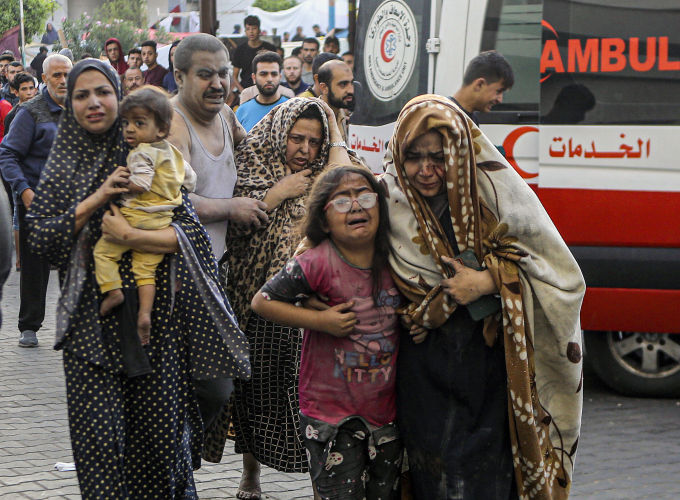
Injured Palestinians arrive at al-Shifa hospital in the central Gaza Strip, October 16. Photo: AP
Israel's relentless airstrikes and strict blockade are depleting supplies in the Gaza Strip, pushing the 2.3 million people living there into increasingly desperate situations. According to the United Nations, more than a million people have fled their homes in northern Gaza following an Israeli evacuation order.
The Israeli military said it was working to ensure civilian safety before launching an offensive against Hamas in northern Gaza. Much of Hamas' network of tunnels, rocket launchers, and military infrastructure is interspersed among residential areas.
Evacuees from northern Gaza continue to face airstrikes in the south. Early on 16 October, an airstrike on the town of Rafah near the border with Egypt collapsed a building housing three families evacuated from Gaza City.
The airstrike completely destroyed the building, killing at least 12 people, burying nine in the rubble.
The United Nations says hospitals in the Gaza Strip will run out of fuel to run generators in the next 24 hours, meaning life support equipment such as incubators and ventilators will stop working, putting thousands of lives at risk.
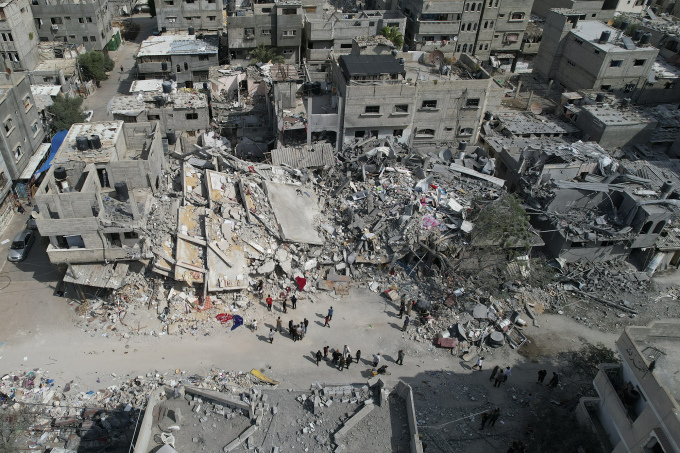
A residential area in ruins after an Israeli airstrike on Nuseirat camp, central Gaza Strip, October 16. Photo: AP
Living under a blockade and constant airstrikes, Gaza residents are desperate for food and water. Many are forced to drink dirty water, facing the risk of spreading disease.
More than 400,000 people are gathered at schools and UNRWA facilities. But UNRWA says it has only one liter of water a day for staff stranded in the area and cannot guarantee essential supplies to refugees as aid is stuck at the border.
"Gaza is running out of water. Gaza is running out of life," said Philippe Lazzarini, head of the organization, calling on Israel to lift the siege. "This is what we need right now."
Food supplies are also running low, with long queues forming outside the few bakeries operating in Gaza. Ahmad Salah in the city of Deir al-Balah said he waited 10 hours to get a kilogram of bread for a family of 20-30.
Meanwhile, Hamas urged residents not to evacuate northern Gaza. The Israeli military released photos on October 15 showing Hamas erecting roadblocks to block traffic moving south.
Doctors and many hospital staff in northern Gaza refused to evacuate, saying it would mean the death of hundreds of critically ill patients and newborns on ventilators. Doctors Without Borders said many decided to stay and treat the wounded, even though they had run out of painkillers and “the wounded were groaning in pain.”
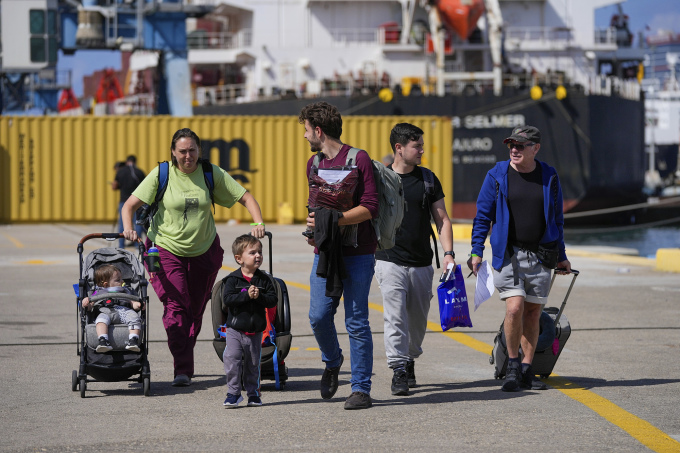
US citizens board an evacuation ship at the port of Haifa, Israel, October 16. Photo: AP
At the Rafah border crossing on the Gaza side, crowds of Palestinians with dual nationality waited anxiously. Some consoled crying children.
The US announced that it had reached an agreement to open the Rafah border crossing so that about 5,000 citizens in the Gaza Strip could evacuate via Egypt, but this operation has not yet been carried out on the ground.
"America is a developed country, always talking about human rights ," said Shurouq Alkhazendar, whose two children are US citizens. "America should protect its citizens first, not leave them to suffer."
The US government also began evacuating about 2,500 citizens by ship from the Israeli port city of Haifa to Cyprus. Most commercial airlines have stopped flying to Israel's Ben Gurion International Airport.
Hong Hanh (According to AP )
Source link


![[Photo] Hanoi morning of October 1: Prolonged flooding, people wade to work](https://vphoto.vietnam.vn/thumb/1200x675/vietnam/resource/IMAGE/2025/10/1/189be28938e3493fa26b2938efa2059e)









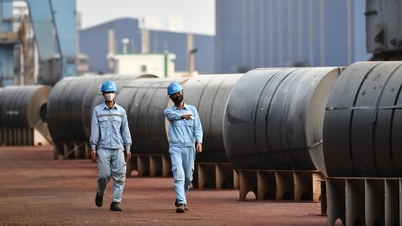

























![[Photo] Panorama of the cable-stayed bridge, the final bottleneck of the Ben Luc-Long Thanh expressway](https://vphoto.vietnam.vn/thumb/1200x675/vietnam/resource/IMAGE/2025/9/30/391fdf21025541d6b2f092e49a17243f)




































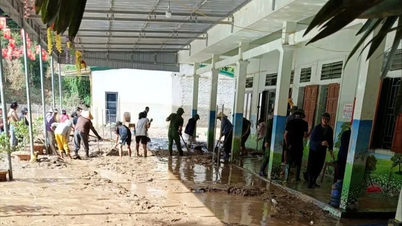


















Comment (0)